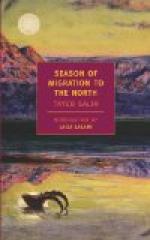[Illustration: Grand Rapids on the Athabasca River]
Now begin the rapids, ninety miles of which we are to run. This rough water on the Athabasca is one of the only two impediments to navigation on the long course between Athabasca Landing and the Polar Ocean. These first rapids, frankly, are a disappointment. The water is high, higher than it has been for ten years, so the boiling over the boulders is not very noticeable. The Pelican Rapid and the Stony we shoot without turning a hair; the Joli Fou is a bit more insistent, but, as the cook says, “nothing to write home about.”
We drift in a drowsy dream of delight, and in the evening arrive at the head of Grand Rapids. If we had looked slightingly on the rough water passed, what we now see would satisfy the greediest. We tie up and get a good view of what lies ahead, and get also our first real introduction to the mosquito. In mid-stream he had not bothered us much, but after supper it rained a little, the day had been warm, and with cymbals, banners, and brass-bands, he comes in cohorts to greet us. The scows have their noses poked into the bank, the men have built smudge fires in front, but we decide that the best way to escape the mosquito is to go to bed. We lie down in the stern-sheets with our clothes on, make night-caps of our Stetson hats, pull the veils down over our necks, and try to sleep, but it is no avail. Each one of these mosquitoes is a Presbyterian mosquito and it has been ordained that this night he is to taste of white blood. It rains incessantly, and that hot hole in which we lie is one brown cloud of mosquitoes. The men on the bank have finally given it up as a bad job, and they set round the fires smoking and slapping different parts of their persons, swearing volubly in English. For the Cree language is devoid of invective. In the morning we are a sorry crowd, conversation is monosyllabic and very much to the point. It is the first serious trial to individual good-humour. When each one of your four million pores is an irritation-channel of mosquito-virus it would be a relief to growl at somebody about something. But the sun and smiles come out at the same time, and, having bled together, we cement bonds of friendship. What did Henry the Fifth say on the eve of Agincourt,—“For he to-day who sheds his blood with me shall be my brother”?
Who would worry about mosquitoes with that splendid spectacular of the Grand Rapids at our feet? The great flood (Kitchee Abowstik) is divided into two channels by an island probably half a mile in length, with its long axis parallel to the flow of the river, and this island solves the question of progress. The main channel to the left is impassable; it is certain death that way. Between the island and the right shore is a passage which on its island side, with nice manipulation, is practicable for empty boats. Then the problem before us is to run the rough water at the near end of the island, tie up there, unload, transfer the pieces by hand-car over the island to its other end, let the empty scows down carefully through the channel by ropes, and reload at the other end.




